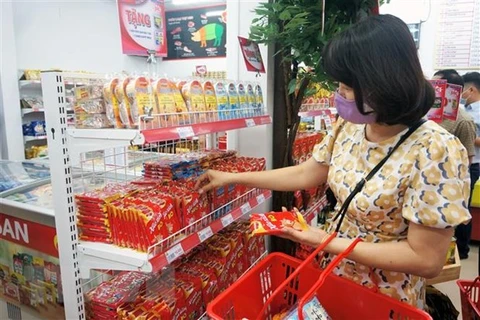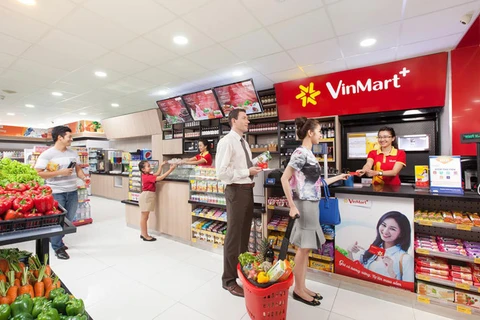Hanoi (VNA) - Vietnam’s retail market has been stirred up recently by two huge deals that confirm the appeal the 100-million-strong market holds.
On May 19, E-mart, the largest retailer in the Republic of Korea (RoK), announced that it will sell its retail store business in Vietnam to local firm the Truong Hai Auto Corporation (THACO).
The move marks the Korean retailer's withdrawal from Vietnam after nearly seven years.
The number of RoK products sold in E-mart outlets in Vietnam rose from 170 in the year it came to Vietnam to 1,200 by 2020.
The E-mart deal comes after a 400 million USD investment from Chinese giant Alibaba in The CrownX, a company owned by the Masan Group Corporation, to operate the VinMart supermarket chain.
The deal is one of the largest by Alibaba in Southeast Asia since it bought Lazada in 2018 for 4 billion USD. It will allow Alibaba and Lazada to access a network of more than 2,000 outlets without having to spend time and money establishing a distribution network. Consumers will also see products sold in VinMart available on Lazada and can pick up orders from Lazada at VinMart.
This is a perfect combination between the two giants in the omni-channel retail trend, according to e-commerce expert Nguyen Huy.
Lazada has acquired a handsome share of Vietnam’s e-commerce market and this deal is expected to help Alibaba speed up its online-to-offline (O2O) scheme in the country.
The leader of one small domestic supermarket said that that since Lazada entered Vietnam, foreign traders have penetrated more deeply into the market through trans-border trading activities, which pose difficulties for domestic production.
Merger and acquisition (M&A) experts said that after a period of relative silence, Vietnam’s retail market has entered a new stage of competition that is much fiercer than previously. M&A deals are forecast to continue to rise in the time to come.
The market has seen strong growth in recent years, of about 10 percent annually to reach some 160 billion USD in value by 2020. Vietnam is considered one of the fastest-growing e-commerce markets in Southeast Asia, after only Indonesia./.
On May 19, E-mart, the largest retailer in the Republic of Korea (RoK), announced that it will sell its retail store business in Vietnam to local firm the Truong Hai Auto Corporation (THACO).
The move marks the Korean retailer's withdrawal from Vietnam after nearly seven years.
The number of RoK products sold in E-mart outlets in Vietnam rose from 170 in the year it came to Vietnam to 1,200 by 2020.
The E-mart deal comes after a 400 million USD investment from Chinese giant Alibaba in The CrownX, a company owned by the Masan Group Corporation, to operate the VinMart supermarket chain.
The deal is one of the largest by Alibaba in Southeast Asia since it bought Lazada in 2018 for 4 billion USD. It will allow Alibaba and Lazada to access a network of more than 2,000 outlets without having to spend time and money establishing a distribution network. Consumers will also see products sold in VinMart available on Lazada and can pick up orders from Lazada at VinMart.
This is a perfect combination between the two giants in the omni-channel retail trend, according to e-commerce expert Nguyen Huy.
Lazada has acquired a handsome share of Vietnam’s e-commerce market and this deal is expected to help Alibaba speed up its online-to-offline (O2O) scheme in the country.
The leader of one small domestic supermarket said that that since Lazada entered Vietnam, foreign traders have penetrated more deeply into the market through trans-border trading activities, which pose difficulties for domestic production.
Merger and acquisition (M&A) experts said that after a period of relative silence, Vietnam’s retail market has entered a new stage of competition that is much fiercer than previously. M&A deals are forecast to continue to rise in the time to come.
The market has seen strong growth in recent years, of about 10 percent annually to reach some 160 billion USD in value by 2020. Vietnam is considered one of the fastest-growing e-commerce markets in Southeast Asia, after only Indonesia./.
VNA
























